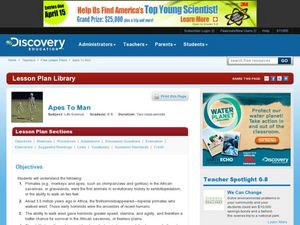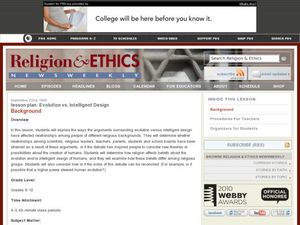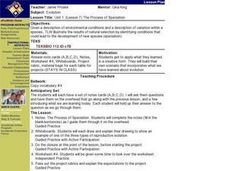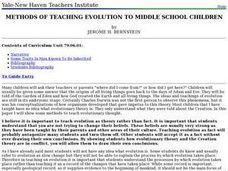Curated OER
Genetic Jewels: Building the DNA Model
Students construct segments of DNA to create a piece of jewelry. In this genetics lesson students create a DNA sequence that they turn into something to wear.
Curated OER
Evolution
Students research the theory of evolution and the controversy. In this evolution lesson students view a film on Charles Darwin then they write an essay about whether or not intelligent design should be taught in science class.
Curated OER
Apes To Man
Students study primates and their evolution history. In this role play lesson students view a video on evolution then demonstrate how primates walked and other observations they noticed in the film.
Curated OER
Investigating Our Past: Where Did Humans Come From?
Students brainstorm about evolution and explore the processes of evolution. In this investigative lesson students map out evolution and compare the two theories after researching them.
Curated OER
How do we know that the theory of evolution is correct?
Students read passages and view a slide show on the theory of evolution and provide evidence that this theory is correct. In this evolution lesson plan, students read about fossils, anatomy, organs, fetal development, and more.
Curated OER
What is evolution and how does it work?
Students discuss the theory of evolution. In this evolution lesson, students discover Charles Darwin and his ideas of heredity, variation, and selection. This lesson gives information for the students to read.
Curated OER
Evolution vs. Intelligent Design
Ninth graders explore the arguments surrounding evolution versus intelligent design have affected relationships among people of different religious backgrounds. In this ethics lesson plan, 9th graders determine whether relationships...
Curated OER
Discovering Dinosaurs
Students discuss that scientists have theories about what dinosaurs were like but are unsure because they are no longer living. In this dinosaur research lesson, students examine how scientists use evidence to determine the behavior and...
Curated OER
Understanding Evolution: Homology and Analogy
For this understanding evolution worksheet, 9th graders define homology and analogy. Students compare and contrast similar structures in several given species.
Curated OER
Charles Darwin
In this Charles Darwin worksheet, students fill in the blank with the correct answer. Students use the suggested text to complete statements about Charles Darwin, his expedition, and his development of his theory of evolution.
Curated OER
Sponges, Cnidarians, Flatworms, and Roundworms
In this simple animals instructional activity, high schoolers compare and contrast the body plans of sponges, cnidarians, flatworms, and roundworms. This instructional activity has 4 short answer questions.
Curated OER
Do-It-Yourself Fossils
For this fossils worksheet, students create their own casts, molds, imprints, and embedded fossils. Then students complete a fossil comparison chart. This worksheet has 12 fill in the blank questions.
Curated OER
The Earliest Primates
In this early primate worksheet, students will read information about the fossil evidence of the earliest primates. Students will complete 3 short answer questions based on their reading.
Curated OER
The Theory of Evolution
In this theory of evolution worksheet, students will review the role Charles Darwin played in the theory of evolution, natural selection, and adaptations. Students will explore some of the different types of evidence for the theory of...
Curated OER
How Do Species Change?
In this species changing worksheet, students will brainstorm problems that species face in their habitats. Then students will write in the solution for each problem they wrote down in this graphic organizer worksheet.
Curated OER
What Do Fossils Reveal?
In this fossils worksheet, students will write down 4 facts that they know about fossils and then come up with 1 conclusion about fossils based on their facts. This worksheet is a graphic organizer.
Curated OER
Change Through Time
In this evolution activity, students will complete a table by writing in the era and biological event based on 4 different time periods of Earth's history. Students will answer 8 fill in the blank questions based on the different origin...
Curated OER
Mr. Biando's Lab Word Search Puzzle
In this Mr. Biando's lab instructional activity, students define, study, review and discuss ten key terms associated with mammals and evolution. Students circle each key term in a word search puzzle.
Curated OER
The Process of Speciation
Students illustrate the results of natural selection by identifying conditions that could lead to the development of new species (speciation) based on a given description of environmental conditions and description of variation within a...
Curated OER
History of Theory of Evolution
Students infer evolutionary relationships by comparing the physiological data or description. They write what they think would happen if a brown bear in the woods had an offspring that was white. Would this help the baby bear in its...
Curated OER
Natural Selection
Pupils comprehend that natural selectionis the tool for adaptation and evolution of populations. They pick three M&M's and no candy corns. Students tally the number of different color M&M's chosen. They discuss why colors were...
Curated OER
Methods of Teaching Evolution To Middle School Children
Young scholars study evolutionary thought. They examine how characteristics are inherited and that they are a source of variation. They illustrate the perpetuation, elimination, and variation made among members of a species. They...
Curated OER
Understanding the Geologic Timescale
Students identify and analyze how the geologic time scale was developed by investigating 11 periods of time and the vast expanse of time of the Earth's existence. They study their period, determine the important factors indicative to...
Curated OER
Darwin's Evolution
Students examine the impact of Charles Darwin and his theories on our life today. After watching a video, they discuss how he formulated his theories and how they have impacted the world both positively and negatively. To end the...

























